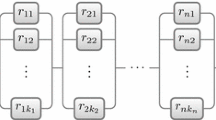Abstract
In the creation of ERP systems, it is important to plan the pilot testing. In pilot projects (also known as experimental projects), the main functions of the system are tested by a limited set of advanced users. In planning the pilot testing, the key is to determine its extent. With too little testing, fundamental functions of the system may not be checked, and the probability of detecting significant errors only at complete rollout will be high. With excessive testing, the work required in the pilot project will be considerably increased, and the required speed and flexibility will not be attained in testing the basic functions. The effectiveness of pilot testing will be no better than the effectiveness of full-scale introduction. A mathematical formulation of the determination of the optimal extent of pilot testing is developed on the basis of the generation of a portfolio of IT services and their scheduling in the creation of the ERP system for a large steel company. The solution of this problem takes the form of a set of services that must be verified and the relations between them, within the specified constraint on the resources devoted to testing, such that optimal results are obtained. The solution is obtained by network programming, based on a structurally similar network representation of the relevant criteria and constraints. A solution procedure is outlined, along with an example of its use. In this procedure, dichotomous programming is used to solve individual problems. The approximate solutions obtained may be improved by solving a double network-programming problem. The branch and bound method may be used to find the global optimum of the initial problem. In that approach, the boundaries are values of the target functions for the approximate solutions. Generalization of this problem is based on the preferences of IT-service users regarding the quality of verification of different relations between the services. Those preferences may be taken into account by weighting the corresponding relationships. That leaves the basic solution procedure unchanged.
Similar content being viewed by others
References
OGC-ITIL V3-6 Service Lifecycle, Introduction to ITIL, London: Stationery Office, 2007.
Belikov, D.V., Application of service model to meet the IT needs of enterprises, Vestn. Samar. Gos. Ekon. Univ., 2011, no. 84, pp. 9–14.
Zimin, V.V., Burkova, I.V., and Zimin, A.V., Modeli i mekhanizmy upravleniya zhiznennym tsiklom IT-servisov (Models and Mechanisms for Life Cycle Management of IT Services), Saarbrucken: LAP LAMBERT Academic, 2017.
Zimin, V.V., Mit’kov, V.V., and Zimin, A.V., Functional volume and working groups of ERP-project of the enterprise, Izv. Vyssh. Uchebn. Zaved., Chern. Metall., 2017, no. 12, pp. 998–1004.
Zimin, V.V., Mit’kov, V.V., and Zimin, A.V., Calendar planning of IT services of the enterprise’s ERP-project, Izv. Vyssh. Uchebn. Zaved., Chern. Metall., 2018, no. 4, pp. 319–325.
Andronnikova, N.G., Barkalov, S.A., Burkov, V.N., and Kotenko, A.M., Modeli i metody optimizatsii regional’nykh programm razvitiya (Models and Methods for Optimization of Regional Development Programs), Moscow: Inst. Probl. Uprav., Ross. Akad. Nauk, 2001.
Andronnikova, N.G., Burkov, V.N., and Leont’ev, S.V., Kompleksnoe otsenivanie v zadachakh regional’nogo upravleniya (Comprehensive Assessment in Regional Administration Tasks), Moscow: Inst. Probl. Uprav., Ross. Akad. Nauk, 2002.
Balashov, V.G., Zalozhnev, A.Yu., Ivashenko, A.A., and Novikov, D.A., Mekhanizmy upravleniya organizatsionnymi proektami (Management Mechanisms of Organizational Projects), Moscow: Inst. Probl. Uprav., Ross. Akad. Nauk, 2003.
Barkalov, S.A., Burkov, V.N., and Gilyazov, N.M., Metody agregirovaniya v upravlenii proektami (Methods of Aggregation in Project Management), Moscow: Inst. Probl. Uprav., Ross. Akad. Nauk, 1999.
Barkalov, P.S., Burkova, I.V., Glagolev, A.V., and Kolpachev, V.N., Zadachi raspredeleniya resursov v upravlenii proektami (Resource Distribution in Project Management), Moscow: Inst. Probl. Uprav., Ross. Akad. Nauk, 2002.
Barkalov, S.A., Burkov, V.N., Kurochka, P.N., and Obraztsov, N.N., Zadachi upravleniya material’notekhnicheskim snabzheniem v rynochnoi ekonomike (The Control of Material and Technical Supply in Market Economics), Moscow: Inst. Probl. Uprav., Ross. Akad. Nauk, 2000.
Barkalov, S.A. and Burkov, V.N., Minimizatsiya upushchennoi vygody v zadachakh upravleniya proektami (Minimization of Lost Profits in Project Management), Moscow: Inst. Probl. Uprav., Ross. Akad. Nauk, 2001.
A Guide to the Project Management Body of Knowledge (PMBOK® Guide), Newtown, Pa: Proj. Manage. Inst., 2000.
Christensen, D.S., An analysis of costs overruns on defense acquisition contracts, Int. J. Proj. Manage., 1993, vol. 24, no. 3, pp. 43–48.
Czamecki, M.T., Managing by Measuring: How to Improve Your Organization’s Performance Through Effective Benchmarking, New York: AMACOM, 1999.
Dinsmore, P.C., Winning in Business with Enterprise Project Management, New York: AMACOM, 1999.
Fleming, Q.W. and Hoppelman, J.M., Earned value Project Management, Newtown, Pa: Proj. Manage. Inst., 1996.
Burkova, I.V., Method of network programming in project management, Extended Abstract of Doctoral (Eng.) Dissertation, Moscow, 2012.
Burkova, I.V., A method of network programming in problems of nonlinear optimization, Autom. Remote Control, 2009, vol. 70, no. 10, pp. 1606–1612.
Korbut, A.A. and Finkel’shtein, Yu.Yu., Diskretnoe programmirovanie (Discrete Programming), Moscow: Nauka, 1969.
Author information
Authors and Affiliations
Corresponding author
Additional information
Original Russian Text © V.V. Zimin, I.V. Burkova, V.V. Mit’kov, A.V. Zimin, 2018, published in Izvestiya Vysshikh Uchebnykh Zavedenii, Chernaya Metallurgiya, 2018, No. 6, pp. 478–484.
About this article
Cite this article
Zimin, V.V., Burkova, I.V., Mit’kov, V.V. et al. Optimizing the Pilot Testing of ERP Systems. Steel Transl. 48, 362–367 (2018). https://doi.org/10.3103/S0967091218060128
Received:
Published:
Issue Date:
DOI: https://doi.org/10.3103/S0967091218060128




